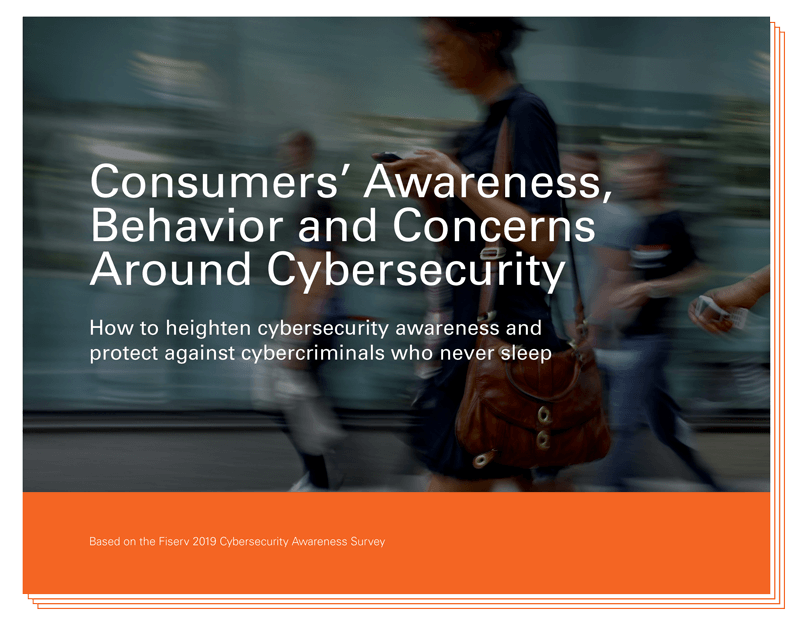FISERV 2019 CYBERSECURITY AWARENESS INSIGHTS STUDY
What do Americans know about cybersecurity?
How employers can help workers protect themselves – and the business
SCROLL DOWN TO
EXPLORE THE REPORT
ABOUT THE SURVEY
Fiserv’s 2019 Cybersecurity Awareness Survey explores how aware American consumers are of online privacy and security risks, and how they behave when it comes to protecting themselves from cyberthreats.
respondents
years of age
female:male
CYBERSECURITY PERSONAS
Based on our research, we determined that consumers fall into five broad personality types when it comes to how well they understand cybercrime, and how much effort they make to protect themselves.
Let us introduce you to…
CONSUMER AWARENESS
We asked consumers how much they know about cybersecurity.
One in four respondents consider themselves not informed…
…And more than half say they could do more to protect their personal information online…
…Yet more than half are bothered by the inconvenience created by advanced security measures – even if that means great protection.
Consumers feel most vulnerable to cyberattacks in these three areas:
Social Media
33%
Online Banking
25%
Online Shopping
23%

“My employer provides a complimentary health and wellness program. I wish they had a cybersecurity wellness program too.”
CONSUMER BEHAVIOR
More than half of consumers say they take steps to reduce their risk of cyberattack. However, few take even as simple a step as changing passwords, unless forced to.
Change password only when forced to
Have a “go-to password” they modify slightly to meet specific password requirements
Would use a non password-protected public Wi-Fi network even for sensitive tasks
Picking Passwords
Consumers tend to choose easy-to-remember passwords close to their heart.
Top choices include:
CUSTOMER VIEWS ON HOW BUSINESSES HANDLE CYBERSECURITY
Americans expect heightened cybersecurity measures from businesses and the government — and they think both parties could do a better job.
Believe cybersecurity is “very important” to the nation’s security
Say that neither businesses nor the government do enough to fight cybercrime
Say their company sends regular cybersecurity updates, such as information about the latest scams
Opening the unknown
We asked people their response to receiving an email at work from an unknown sender. Here’s what they said they would do:
With fewer than half saying they would delete a suspicious email without opening it, there’s clearly work to be done in educating employees about the risks of phishing and other cyberattacks.
HOW BUSINESSES CAN HELP THEIR EMPLOYEES BE MORE CYBER AWARE – AND SECURE
As a leader in financial services, Fiserv has a deep expertise in preventing and protecting against cybercrime.
Here are three tips you, as an employer, can share with your employees to help keep them cyber aware and cyber secure in the office, at home, and on the go.

01
Safety While You Work
Ensuring company data is protected from the latest cyber security threats is one of the biggest responsibilities your company’s IT department bears. Educating your employees on cyber security threats is a best practice followed by companies who issue hardware used outside office walls.

02
Lock Down Your Home
Encourage employees to secure their home network, a good start would be making sure to change default passwords, especially their routers. This helps to protect any data stored or device connected to their home networks. For those that have families, emphasize the importance of teaching them about the dangers of cyber predators, who often target teenagers and young children.

03
Keeping Your Assets Out of the Public Eye
Whether on personal or business computers, educate employees on covering up their screens when entering passwords and credentials in public areas. After all, with mobile device cameras continuing to impress with stronger zoom features and unprecedented pixel rates, you never know who may be watching.

LEARN MORE ABOUT THE FISERV
2019 CYBERSECURITY AWARENESS SURVEY
The 2019 Cybersecurity Awareness Insights Study is a unique and timely exploration into consumers’ attitudes, behavior, and concerns around online privacy and security.
The findings have significance for businesses and government, and employers of every size.
This online review highlights the key findings. To take a deeper dive, we invite you to download the full report.







